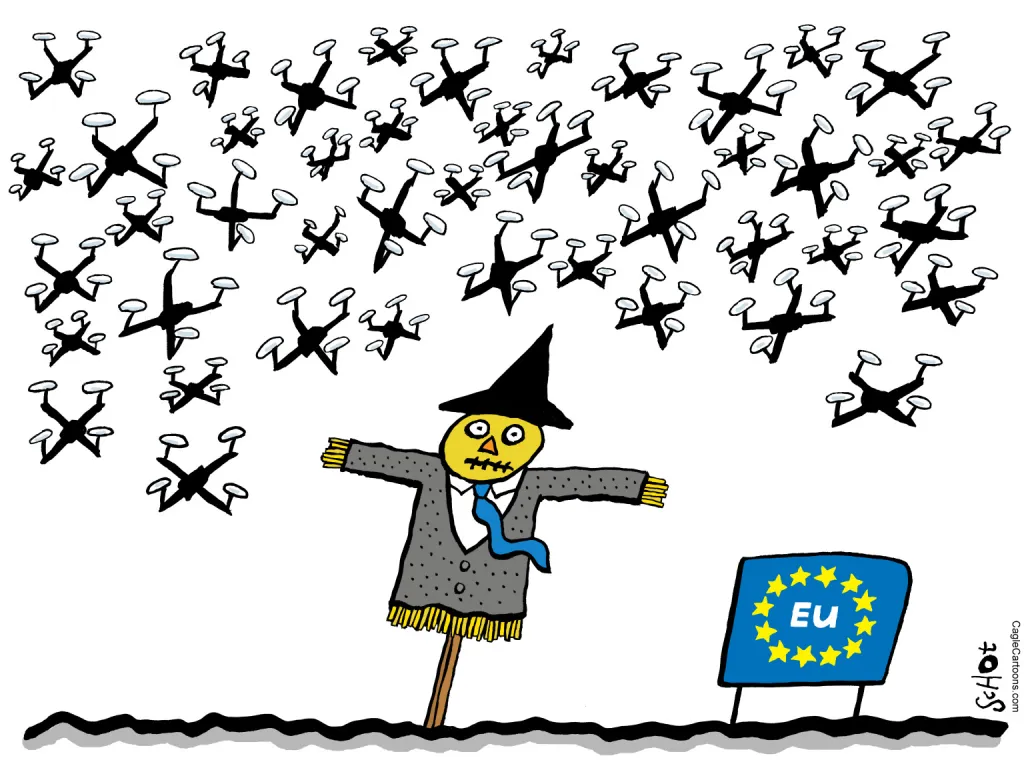
Operations at Munich’s airport were recently halted by drones. Several Danish airports, including Copenhagen’s, and a military air base where Denmark stations F-16s and F-35s, have been disrupted by drones. Denmark, whose support for Ukraine has been robust, will soon host a Ukrainian weapons manufacturer.
Poland and Romania have experienced harassing drones. In multiple instances, “shadow ships” (worldwide, the “shadow fleet” of ships that conceal their identities and activities numbers about 1,000) have been accused of cutting undersea cables crucial to Europe commercial and military infrastructure.
On Sept. 19, three Russian MiG-31s violated Estonia’s airspace before being repelled by NATO-assigned Italian F-35s. It was the fifth Russian incursion this year. Russia says blaming it for these provocations (and for a campaign of assassinations and sabotage in Europe) is provocative. Read on, remembering Estonia.
Vladimir Putin’s purposes probably include intelligence gathering: monitoring the military responses the targeted nations make and how quickly they make them. He also is measuring the West’s continuing commitment to noncommittal dithering.
Russia has launched this torrent of aggressions. The aggressed against still call this “hybrid” or “gray zone” war. Erase the adjectives. This is war.
So, here are 119 pages of wartime reading: “If Russia Wins: A Scenario” by Carlo Masala, professor of international politics at Munich’s Bundeswehr University, which serves Germany’s armed forces. An immediate bestseller in Germany and then the Netherlands, the booklet has been published in London but not yet in America. His scenario is a literary device to frame a question: Suppose Russia’s victory in Ukraine “is only the beginning”?
Masala’s scenario begins in March 2028, when two Russian brigades surge into Narva, Estonia’s third-largest city (population 57,000), on Russia’s border. Eighty-eight percent of the residents are Russian-speaking, and many have been supplied with smuggled small arms and machine guns.
Simultaneously, Russian soldiers disguised as tourists take ferries to seize the Estonian coastal island of Hiiumaa. The attack on the three Baltic states, each a NATO member, has begun.
It is three years since Ukraine, pressured by China and the United States, signed a capitulation to Russia. Ukraine surrendered more than 20% of its territory, agreed to permanent neutrality (no NATO membership) and peacekeeping troops from many nations, including China.
The project of bringing all Russian-speaking regions in what Russia calls the “near abroad” under Moscow’s control mimics Hitler’s prewar absorption of German-speakers (in Austria, the Sudetenland, Danzig). After the victory over Ukraine, Putin resigns. His chosen 47-year-old successor is hailed in the West as “a new Gorbachev,” draining urgency from protecting the Baltics.
To show the West its inability to act, Russia’s new president mimics Hitler’s “remilitarization of the Rhineland.” In March 1936, 30,000 German troops marched across Rhine River bridges to nullify the demilitarization Germany had accepted in 1919. Germany in 1936 spoke soothingly of having no aggressive intentions regarding neighboring nations. Its action was accepted.
Next, Masala imagines, Russian operatives orchestrate a flotilla of migrants to inflame and distract European populations, and to draw NATO frigates away from the Baltic Sea. China, Russia’s accomplice, creates a micro-crisis with a U.S. ally, the Philippines, confident that America will not risk war over a reef.
Russia is confident that America will not risk war over an Estonian border town. Although there is a suspicious assassination (by a ground-to-air missile) of the CEO of Germany’s leading manufacturer of armored military vehicles. And suspicious explosions at the port where Britain’s nuclear submarines are based.
NATO convenes, and some member nations go wobbly, saying: Estonia has not properly respected the rights of Russian-speakers. Russia’s goals are limited. Russia’s behavior is reprehensible but consider the “historical context.” Isn’t the independence of the Baltic states an “artificial construct”?
The U.S. president opposes NATO acting, which it cannot do without U.S. reconnaissance and transport capabilities. France and Germany, with ascending far-right populist parties, are also reluctant. So, Russia’s nuclear arsenal deters a conventional response to a limited regional escalation — the taking of a small Estonian town.
Now, return to Masala’s scenario-as-question: What if Russia’s winning in Ukraine were only the beginning? The beginning of the enfeeblement of the United States?
Putin strolled down Donald Trump’s red carpet in Alaska, then took none of the steps regarding Ukraine that Trump said were necessary for Russia to avoid “very severe consequences.” Instead, Putin intensified Russian attacks.
A connoisseur of Western dithering, Putin probably anticipated the response his current flurry of contemptuous aggressions has elicited. Trump has said: “I don’t love it.”
George F. Will is a columnist for the Washington Post.



